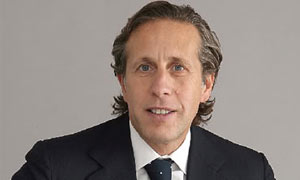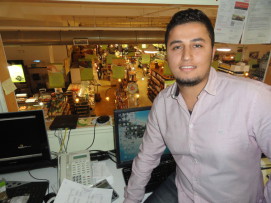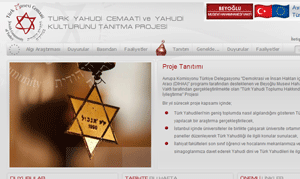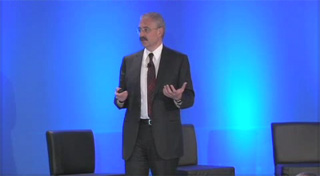
Turkish immigrant Hamdi Ulukaya always wondered why U.S. yogurt was so bad. Now, his New Berlin, New York-based Chobani is the leader in Greek-style yogurt. A self-described “dairy boy,” Hamdi Ulukaya grew up in Erzincan, Turkey, working on his family’s dairy farm and in its feta cheese operation. After studying politics in Turkey, he initially came to the U.S. to study English at New York's Adelphi University, and then to do graduate work at SUNY. In 2005, Ulukaya says he used an SBA loan to buy an old yogurt-making plant in upstate New York. Now Ulukaya’s company, Chobani, has more than 1,200 employees, annual revenues of more than $600 million, and is building a plant in Australia. Ulukaya spoke with Inc.’s Kimberly Weisul about start-ups, ghosts, and, of course, yogurt.
 Utah Jazz fan favorite Enes Kanter gave an entertaining interview to Kyle Gunther of 1320 KFAN in Salt Lake City on Wednesday. Kanter touched on many funny topics such as his absurd diet, his bucket list, and his rookie hazing experience. The 2011 No. 3 overall draft pick also told Gunther that his home in Utah is haunted. Kanter says he rented a big house in Salt Lake City and that he’s experienced many strange incidents there recently.
Utah Jazz fan favorite Enes Kanter gave an entertaining interview to Kyle Gunther of 1320 KFAN in Salt Lake City on Wednesday. Kanter touched on many funny topics such as his absurd diet, his bucket list, and his rookie hazing experience. The 2011 No. 3 overall draft pick also told Gunther that his home in Utah is haunted. Kanter says he rented a big house in Salt Lake City and that he’s experienced many strange incidents there recently.

 By Melih Abdulhayoglu - November 6th is upon us, which in the United States means it is Election Day. And it isn’t just any Election Day but for the position of President of the United States. For months on end the 2012 Presidential Campaign has had few topics in which the two candidates actually agree on. In what has been one of the most heated campaigns in recent memory, between incumbent President Barack Obama and Republican candidate, Massachusetts Governor Mitt Romney, these two have essentially argued over everything from pulling the troops out of Afghanistan, Healthcare, and the budgets with what seems to be no intentions of any bipartisan compromise.
By Melih Abdulhayoglu - November 6th is upon us, which in the United States means it is Election Day. And it isn’t just any Election Day but for the position of President of the United States. For months on end the 2012 Presidential Campaign has had few topics in which the two candidates actually agree on. In what has been one of the most heated campaigns in recent memory, between incumbent President Barack Obama and Republican candidate, Massachusetts Governor Mitt Romney, these two have essentially argued over everything from pulling the troops out of Afghanistan, Healthcare, and the budgets with what seems to be no intentions of any bipartisan compromise. “We just made history,” tweeted the campaign managers of Barack Obama four years ago, a reference, among other things, to the effective use of social media throughout the Obama campaign. If John F. Kennedy was the first American president to have used the new medium, television, to his advantage, Obama was the first one to use social media, successfully managing a flourishing grassroots campaign. Regardless of who becomes the next occupant of the White House, the U.S. presidential elections tomorrow will not be the elections that made history. It was the 2008 elections. “If not for the Internet, Barack Obama would not be president or even the democratic nominee,” Arianna Huffington of the Huffington Post website boldly said following Obama’s win in 2008.
“We just made history,” tweeted the campaign managers of Barack Obama four years ago, a reference, among other things, to the effective use of social media throughout the Obama campaign. If John F. Kennedy was the first American president to have used the new medium, television, to his advantage, Obama was the first one to use social media, successfully managing a flourishing grassroots campaign. Regardless of who becomes the next occupant of the White House, the U.S. presidential elections tomorrow will not be the elections that made history. It was the 2008 elections. “If not for the Internet, Barack Obama would not be president or even the democratic nominee,” Arianna Huffington of the Huffington Post website boldly said following Obama’s win in 2008.  Zurich/Switzerland - Barry Callebaut, the world's leading manufacturer of high-quality cocoa and chocolate products, announced today the building of a factory for chocolate and compounds in Eskisehir, Turkey. The new facility will serve as a basis to participate in the further growth potential of the Turkish chocolate market as well as to capture opportunities in the regional market.
Zurich/Switzerland - Barry Callebaut, the world's leading manufacturer of high-quality cocoa and chocolate products, announced today the building of a factory for chocolate and compounds in Eskisehir, Turkey. The new facility will serve as a basis to participate in the further growth potential of the Turkish chocolate market as well as to capture opportunities in the regional market. Just weeks after its much-heralded arrival in the UK, US yoghurt heavyweight Chobani is facing a potentially damaging lawsuit in the High Court over its right to use the term ‘Greek yoghurt’. Fage, the Greek owner of the Total Greek Yoghurt brand, is suing Chobani because it wants it to stop describing the yoghurts it sells in the UK - and which are made in the US - as ‘Greek yoghurt’. Only yoghurt made in Greece should be called ‘Greek’, it argues - products made elsewhere should be described as ‘Greek-style’ instead.
Just weeks after its much-heralded arrival in the UK, US yoghurt heavyweight Chobani is facing a potentially damaging lawsuit in the High Court over its right to use the term ‘Greek yoghurt’. Fage, the Greek owner of the Total Greek Yoghurt brand, is suing Chobani because it wants it to stop describing the yoghurts it sells in the UK - and which are made in the US - as ‘Greek yoghurt’. Only yoghurt made in Greece should be called ‘Greek’, it argues - products made elsewhere should be described as ‘Greek-style’ instead.  The first 16 beneficiaries of a £26m gift from a record label have begun their studies in Oxford. Mica Ertegun, widow of Atlantic founder Ahmet Ertegun, has given the money to the University of Oxford. It has been used to fully fund the humanities scholars and refurbish a four-storey study centre. The university said it hoped to bring in rock stars as guest lecturers to "broaden the students' cultural horizons". The scholarship is expected to grow to fund at least 35 Ertegun scholars each year and to last forever.
The first 16 beneficiaries of a £26m gift from a record label have begun their studies in Oxford. Mica Ertegun, widow of Atlantic founder Ahmet Ertegun, has given the money to the University of Oxford. It has been used to fully fund the humanities scholars and refurbish a four-storey study centre. The university said it hoped to bring in rock stars as guest lecturers to "broaden the students' cultural horizons". The scholarship is expected to grow to fund at least 35 Ertegun scholars each year and to last forever.  After five years on the market, developer Izak Senbahar has finally found a buyer for his co-op at The Mark. Unit 1501 at 25 East 77th St has sold and closed for $10.5 million, sources say. The 3,183 s/f, three-bedroom condo came on the market in 2008 with an asking price of $15.75 million. It was most recently reduced to $11.5 million.
After five years on the market, developer Izak Senbahar has finally found a buyer for his co-op at The Mark. Unit 1501 at 25 East 77th St has sold and closed for $10.5 million, sources say. The 3,183 s/f, three-bedroom condo came on the market in 2008 with an asking price of $15.75 million. It was most recently reduced to $11.5 million.  Zeytinia market's General Manager Mucahit Arici says its business as usual at the Croton-on-Hudson grocery store. But he does say that he occasionally gets questions from customers regarding the store's tax evasion case. "It's true that people came into the store and they've asked if Zeytinia was closing down, because they like to come in," said Arici. "They like to shop in local places. And we just told them that we just have the case going on."
Zeytinia market's General Manager Mucahit Arici says its business as usual at the Croton-on-Hudson grocery store. But he does say that he occasionally gets questions from customers regarding the store's tax evasion case. "It's true that people came into the store and they've asked if Zeytinia was closing down, because they like to come in," said Arici. "They like to shop in local places. And we just told them that we just have the case going on." Zalide Toledo, head of the Association of Israeli Turks Foundation in BatYam city of Israel, said that nearly 100,000 Jews of Turkish origin were living in Israel. Toledo told AA on Wednesday that Turkish Jews were mainly living in BatYam, Ashkelon and Tel Aviv, adding that they were not specialized on a certain line of business. You can see Jews of Turkish origin in almost every profession, Toledo noted, adding that mass migration of Jews from Turkey to Israel began in 1948.
Zalide Toledo, head of the Association of Israeli Turks Foundation in BatYam city of Israel, said that nearly 100,000 Jews of Turkish origin were living in Israel. Toledo told AA on Wednesday that Turkish Jews were mainly living in BatYam, Ashkelon and Tel Aviv, adding that they were not specialized on a certain line of business. You can see Jews of Turkish origin in almost every profession, Toledo noted, adding that mass migration of Jews from Turkey to Israel began in 1948.  But to grow in the 21st century, the company knows it needs to do more than that. For that reason, Boeing [BA 72.82 -0.88 (-1.19%) ] has been aggressively diversifying. Take space, for example. The company was recently awarded a $460 million contract by NASA to pursue human spaceflight for government and commercial purposes. That's small change for a $55 billion company, but Boeing clearly sees space travel as a key component of its future. So what makes Boeing think they are so likely to succeed?
But to grow in the 21st century, the company knows it needs to do more than that. For that reason, Boeing [BA 72.82 -0.88 (-1.19%) ] has been aggressively diversifying. Take space, for example. The company was recently awarded a $460 million contract by NASA to pursue human spaceflight for government and commercial purposes. That's small change for a $55 billion company, but Boeing clearly sees space travel as a key component of its future. So what makes Boeing think they are so likely to succeed?  The analogue industry is at an inflection point, says Tunc Doluca, CEO of Maxim Integrated. It is consolidating, it is increasingly focussed on mobility and it is heading towards higher levels of integration. "Originally the analogue industry was dominated by building blocks," says Doluca, "now we can help a customer build a system. The old single-function building block industry is going. Companies which can build highly integrated solutions can benefit."
The analogue industry is at an inflection point, says Tunc Doluca, CEO of Maxim Integrated. It is consolidating, it is increasingly focussed on mobility and it is heading towards higher levels of integration. "Originally the analogue industry was dominated by building blocks," says Doluca, "now we can help a customer build a system. The old single-function building block industry is going. Companies which can build highly integrated solutions can benefit."  Turkish Airlines has announced an order for 15 Boeing 777-300ERs plus five options. Three of the aircraft will be delivered in 2014, followed by seven in 2015, five in 2016 and five in 2017. Boeing's list price for the order is approximately $6.3 billion. The Turkish flag carrier has been playing up the prospect of orders with both Boeing and Airbus in recent weeks.
Turkish Airlines has announced an order for 15 Boeing 777-300ERs plus five options. Three of the aircraft will be delivered in 2014, followed by seven in 2015, five in 2016 and five in 2017. Boeing's list price for the order is approximately $6.3 billion. The Turkish flag carrier has been playing up the prospect of orders with both Boeing and Airbus in recent weeks.  Dr. Mehmet Oz, the host of the nationally syndicated TV program, The Dr. Oz Show, today endorsed genetically engineered (GE) food labeling, a fundamental right already in place in 50 countries around the world, including all of Europe, Japan, India and China.
Dr. Mehmet Oz, the host of the nationally syndicated TV program, The Dr. Oz Show, today endorsed genetically engineered (GE) food labeling, a fundamental right already in place in 50 countries around the world, including all of Europe, Japan, India and China.  Turkish immigrant Hamdi Ulukaya always wondered why U.S. yogurt was so bad. Now, his New Berlin, New York-based Chobani is the leader in Greek-style yogurt. A self-described “dairy boy,” Hamdi Ulukaya grew up in Erzincan, Turkey, working on his family’s dairy farm and in its feta cheese operation. After studying politics in Turkey, he initially came to the U.S. to study English at New York's Adelphi University, and then to do graduate work at SUNY. In 2005, Ulukaya says he used an SBA loan to buy an old yogurt-making plant in upstate New York. Now Ulukaya’s company, Chobani, has more than 1,200 employees, annual revenues of more than $600 million, and is building a plant in Australia. Ulukaya spoke with Inc.’s Kimberly Weisul about start-ups, ghosts, and, of course, yogurt.
Turkish immigrant Hamdi Ulukaya always wondered why U.S. yogurt was so bad. Now, his New Berlin, New York-based Chobani is the leader in Greek-style yogurt. A self-described “dairy boy,” Hamdi Ulukaya grew up in Erzincan, Turkey, working on his family’s dairy farm and in its feta cheese operation. After studying politics in Turkey, he initially came to the U.S. to study English at New York's Adelphi University, and then to do graduate work at SUNY. In 2005, Ulukaya says he used an SBA loan to buy an old yogurt-making plant in upstate New York. Now Ulukaya’s company, Chobani, has more than 1,200 employees, annual revenues of more than $600 million, and is building a plant in Australia. Ulukaya spoke with Inc.’s Kimberly Weisul about start-ups, ghosts, and, of course, yogurt.





